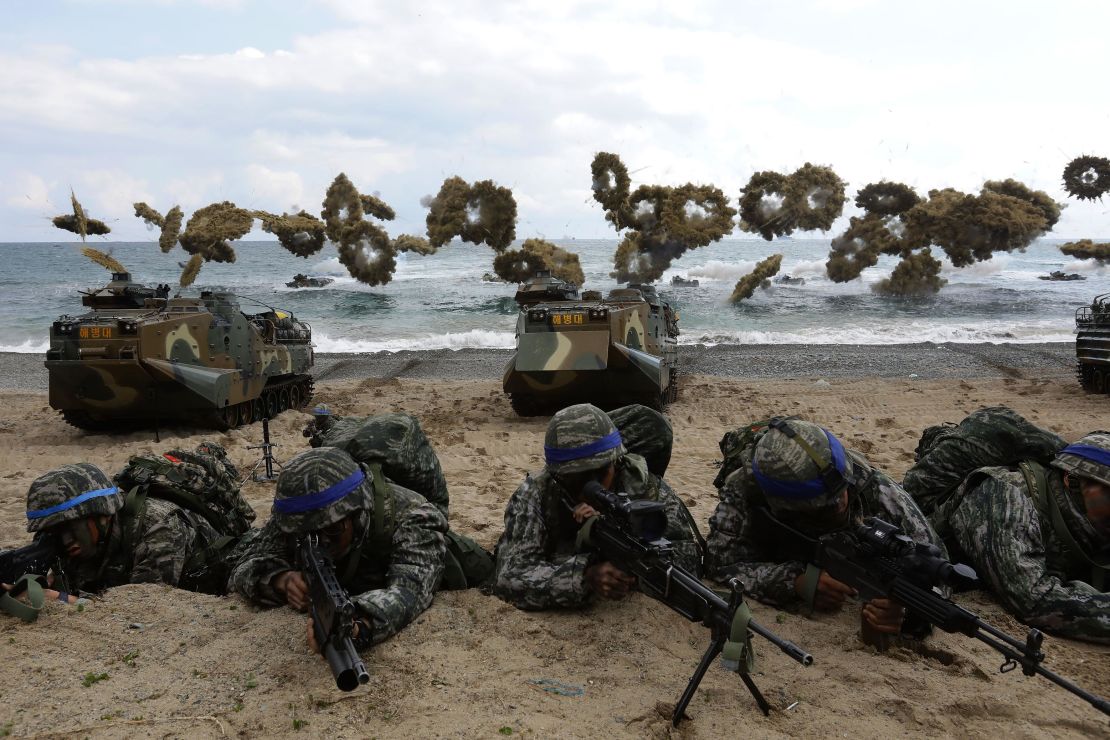South Korea jails more conscientious objectors than any other country, but that may be about to change.
All South Korean men aged 18 to 35 must perform military service, but the country’s Constitutional Court ruled Thursday that the government must provide alternative civilian roles for those who refuse to take up arms, due to religious or political reasons.
“The state can no longer delay resolving this problem,” the court said in a 6-3 ruling finding that Article 5 of the country’s Military Service Act was unconstitutional because it does not offer any non-military options.
It gave the government and Parliament until the end of 2019 to revise the law.
South Korea jails more conscientious objectors than the rest of the world put together, according to Amnesty International, with hundreds imprisoned every year, many of them Jehovah’s Witnesses who refuse to serve due to their religious beliefs.
More than 230 conscientious objectors are currently in prison, the group said. Most receive sentences of around 18 months, but can face a lifetime of discrimination once they are released.
In a statement after the ruling, Amnesty researcher Hiroka Shoji said it sends a “clear message that conscientious objection to military service is a human right.”
“Conscientious objection is not a crime and we urge the government to go further. All conscientious objectors should have their criminal records erased and those young men that languish in prison should be immediately and unconditionally released,” Shoji said.

Mandatory service
Under current South Korean law, all men between the ages of 18 and 35 are required to perform at least 21 months of military service. The Defense Ministry has pledged to reduce the term to 18 months by 2020.
The law has derailed the careers of many of the country’s biggest sports stars and K-Pop artists, with hugely popular boy band Big Bang having to go on hiatus recently so its members can perform their military service.
Many members of South Korea’s national men’s football team, who this week knocked champions Germany out of the World Cup, could also be forced to join the military, though multiple petitions have been filed to the official Blue House website urging President Moon Jae-in to issue the football players an official exemption.
Those without a chance of a presidential pardon have turned to more drastic measures: many young men intentionally gain or lose weight, feign mental illness, get full body tattoos, or self-harm in order to get an exemption, according to the Yonhap news agency.
Surprise medical inspections can be ordered for anyone suspected of changing their weight, and those found guilty of attempting to avoid service can face legal repercussions.
In the past there has been tremendous public criticism of those, such as the children of government officials, who manage to find loopholes in order to avoid military service.
Yoo Seung-jun, a hugely popular singer in the 1990s, had to give up his career in South Korea after he was accused of evading military service by becoming a US citizen. He is still banned from entering South Korea.

Objecting on principle
While most South Korean men, either willingly or because they have exhausted all other possibilities, do eventually perform their military service, for some this is not an acceptable option.
South Korea is a country still at war, after a 1953 armistice which ended fighting on the Peninsula was never converted to a formal peace treaty. While major steps have been taken to remedying that thanks to Moon and US President Donald Trump’s meetings with North Korean leader Kim Jong Un, serving in the military means potentially being ordered to fight and kill.
This is unacceptable for pacifists or those whose religious beliefs forbid such action, but until the Constitutional Court’s ruling this week, conscientious objectors faced prison if they refused to serve in the military.
“Many conscientious objectors are punished twice as government-linked organizations and many private companies refuse to hire applicants with criminal records,” lawyer Baek Jong-keon, who was himself jailed for 12 months and had his legal license revoked for five years, wrote last September.
Gender relations
Beyond objections to violence, South Korean men have another very valid reason for seeking to avoid military service: the army is notorious for the hazing and abuse many recruits go through.
In 2014, then President Park Geun-hye urged action after photos emerged of the bruised and bloody body of a 20-year-old private, who was beaten and abused every day for a month before he eventually died.
The tough experiences of many men in the military have been at the core of an anti-feminist backlash to the #MeToo movement in South Korea by men’s rights groups, even as the country has made some progress in tackling issues of sexual harassment and assault.
James Turnbull, a Busan-based expert on Korean feminism and popular culture, said this reaction is “overwhelmingly driven by (the) perceived unfairness” that men perform military service while women do not.
But he said that their time in the army is largely responsible for the negative attitudes and behavior the #MeToo movement is seeking to stamp out.
Korea ranked 118th out of 144 countries in the World Economic Forum’s 2017 Global Gender Gap Report, and women are severely underrepresented in politics and business.
“It’s difficult to overemphasize the role of the military as a socialization agent” for young men, Turnbull said, many of whom join the military “after their first year of university, barely out of high school” and have little interaction with women during that time except female K-Pop groups who perform at bases.
“This vision of women and male-female relations that the combination engenders – that men’s role is to do important work for the nation, while women’s is to remain on the sidelines offering their support, especially through their youthful looks and sexual availability – is pervasive in Korean daily life.”
CNN’s Ella Ha and Yoonjung Seo contributed to this report from Seoul, South Korea.

